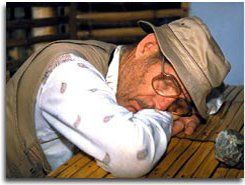Snoring & Sleep Apnea

Jeffrey R. Prinsell, D.M.D., M.D. in Marietta, Georgia, treats snoring and sleep apnea. Obstructive Sleep apnea is a potentially life-threatening medical disorder that affects approximately 10 percent of the population and is more common in males. Snoring associated with pauses or gasping, as well as daytime sleepiness, are the two most common signs of sleep apnea. It can also cause irritability, depression, morning headaches, memory loss, decreased sex drive, and impaired concentration. Sleep apnea progressively worsens with advancing age and/or weight gain. Left untreated, it can cause high blood pressure, cardiovascular problems, strokes, and heart attacks, which may occur during sleep, as well as motor vehicle accidents due to drowsiness while driving.

Sleep apnea is diagnosed by an overnight sleep study, usually performed at a sleep center. Initial treatment may include weight loss, change in sleep position or nasal CPAP (Continuous Positive Airway Pressure), which is administered via a nasal mask while asleep. If these treatments are not applicable, unsuccessful, or intolerable, then Dr. Prinsell can evaluate the airway to determine the specific areas of obstruction and, therefore, propose treatment such as oral appliances or surgery that is specific for each individual patient.
Oral Appliances for Snoring & Sleep Apnea
Dr. Prinsell fabricates custom-fitted oral appliances, which are removable orthodontic-like retainer mouth devices that are worn only while asleep to hold the lower jaw (and therefore the tongue base) forward to open the airway (much like a CPR jaw-thrust) to treat snoring and sleep apnea. The amount of jaw advancement is adjustable and, thus, quite comfortable. For severe sleep apnea, they may also be used in combination with nasal CPAP (thereby allowing lower air pressures that may be more tolerable).
Surgery for Sleep Apnea
Dr. Prinsell reported in the journal Chest
(vol. 116, no 6, pp 1519-1529, 1999)
a 100 percent success rate, in a five-year 18-center clinical study of maxillomandibular advancement (MMA) surgery in a site-specific treatment approach for obstructive sleep apnea in 50 consecutive patients. This operation, which requires an overnight hospital stay, surgically advances the jaw structures to pull forward and tighten the attached soft tissues, to open the entire upper airway - much like a "CPR jaw-thrust" maneuver. Because no incisions are in the throat or on the face, there are minimal risks of airway swelling, palatal dysfunction, or visible scars. Adjunctive nonpharyngeal nasal/sinus surgery and neck lipectomy may also be performed together with MMA as a safe, single-staged operation. The results showed a dramatic improvement in the quality and quantity of sleep, blood pressure, and daytime symptoms such as sleepiness. This 100 percent success rate, highest ever published in a study of this size, suggests that MMA is the most effective acceptable surgical treatment of sleep apnea, with a therapeutic efficacy equal to, but without the compliance problems associated with, nasal CPAP (J Oral Maxillofac Surg 70:1659-1677, 2012).
Please contact our office for reprints of these articles, which also report several other innovations in diagnostic imaging, surgical techniques, goals, guidelines, and patient care following surgery.
Dr. Prinsell is a surgical consultant with numerous sleep centers. As Founding President of the American Board of Dental Sleep Medicine, past President of the American Academy of Dental Sleep Medicine, and former President of the Sleep Disorders Dental Society, Dr. Prinsell is knowledgeable and experienced in oral appliance therapy. His success rate for the surgical treatment of Sleep Apnea, as reported in the medical literature, is among the highest in the world.